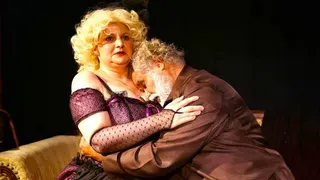October 7, 2006
Kate: The Woman Who Was Hepburn
Kilian Melloy READ TIME: 4 MIN.
Talking to the relaxed young man on a sunny Sunday afternoon, you wouldn't guess anything too bad had ever happened in his life.
"Time heals," he said. "I've come to accept what happened."
J. is referring to the life he fled in Colombia. The country has undergone decades of battles between rebel groups and the government. One group, the Revolutionary Armed Forces of Colombia (FARC), killed J.'s sister when he was about 13. Four years later, members of the group killed his father. Both had been active supporters of the country's government.
J. himself had received death threats for his community work, and he'd been harassed by police because he's gay.
Then, after residing in the U.S. for several years, J. was diagnosed with HIV.
His 2006 diagnosis was bad news, but it also gave him hope for a new life: An immigration judge granted asylum to J. late last month on the basis of his HIV status and his sexual orientation.
The Bay Area Reporter agreed not to use J.'s name in this story. His attorney, John Kennedy, explained that there are confidentiality provisions related to asylum cases, which are normally closed to the public.
But winning an asylum case is not easy, and Kennedy said cases such as this one are "somewhat rare."
Kennedy, who represented J. pro bono, arranged for documentation of violence against gays to be presented, and J. himself testified about the harassment he experienced, but Kennedy said that without J.'s HIV diagnosis, "[we] would have had a much more difficult time."
Kennedy said that the judge issued her decision from the bench after the hearing.
J., who is in his late 20s, said he wishes his father and sister were still alive. But after being granted asylum, he said he has a sense of peace. "I can plan my future," he said.
The decision follows years of uncertainty. J. didn't know to apply for asylum when he first came to the United States in 2000, and missed the one-year deadline.
A few months after his father was killed, the FARC started calling J. with death threats, he said. He'd been working with youth in his home city of Medellin, educating them about democracy and drug prevention.
His mother and friends urged him to leave the country. Six months after his father's murder, J. fled to Miami on a three-month visa.
Many people in similar situations aren't granted asylum, according to Dusty Araujo, asylum documentation coordinator for the National Asylum Partnership on Sexual Orientation, a program of the National Immigration Justice Center.
People contact the program for documentation of harassment and violence in different countries, in order to support asylum cases. Araujo said that since 2000, out of the 67 national contacts related to cases involving sexual orientation, HIV status, and missing the one-year deadline, 15 were granted asylum.
Araujo said some individual requests might have been for documentation for several cases. He also said not everyone who contacts program staff for documentation lets them know the outcome, so it's hard to be sure about the numbers.
About two years after arriving in the United States - and about a year after unknowingly missing the one-year deadline - J. learned about asylum when a friend's uncle fled to Florida from Colombia and was granted asylum. J. completed an application. He listed political persecution because he didn't know sexual orientation was an option. At the time, sexual orientation was just starting to be used in asylum cases. It became a crucial part of his case.
When J. was 18, he said that police rounded up him and about 20 other men at a gay nightclub and drove them to the edge of town in a van. J. said he'd heard stories about the police beating people up and was afraid of what was going to happen to him and the others.
J. said the police told them, "The next time we'll beat the crap out of you for being faggots" but let them go.
On another occasion, J. and another man were performing oral sex on each other in an isolated park. Men from a nearby military base saw them, pointed guns at them, and marched them to the top of a hill. They were released after about an hour, he said.
A former boyfriend of J.'s was stabbed on two separate occasions. J. said that he was sure it was because of his sexual orientation. J. also said he knew of an HIV clinic that had been bombed.
Since J. had missed the deadline, his case was put into removal proceedings, meaning he could argue his case, but if a judge found no basis to grant asylum or waive the one-year rule, he could be deported.
Eventually, though, J. moved to San Francisco, where an immigration judge urged him to get a lawyer. After one attorney was not able to take the case pro bono, it was referred to the Lawyers Committee for Civil Rights, which did an intake, Kennedy explained. The committee then referred the case to BALIF, which is when Kennedy, a member of the LGBT lawyers group, learned about it.
Kennedy said that he needed to find an "extraordinary circumstance" to waive the one-year rule.
He said he had J. tested for post-traumatic stress disorder, but by that time, he wasn't exhibiting traits. Then, while J. went through medical tests required for asylum, he was diagnosed with HIV.
Kennedy said he presented J.'s HIV status as a serious physical disability for which he may not receive adequate medical treatment in Colombia. Kennedy also argued that J. likely would be harassed because of his HIV status and his sexual orientation if he returned. The judge set aside the one-year rule, and granted asylum.
J. said he was both shocked and happy at the decision.
"I can move forward with my life," he said.
Kilian Melloy serves as EDGE Media Network's Associate Arts Editor and Staff Contributor. His professional memberships include the National Lesbian & Gay Journalists Association, the Boston Online Film Critics Association, The Gay and Lesbian Entertainment Critics Association, and the Boston Theater Critics Association's Elliot Norton Awards Committee.







